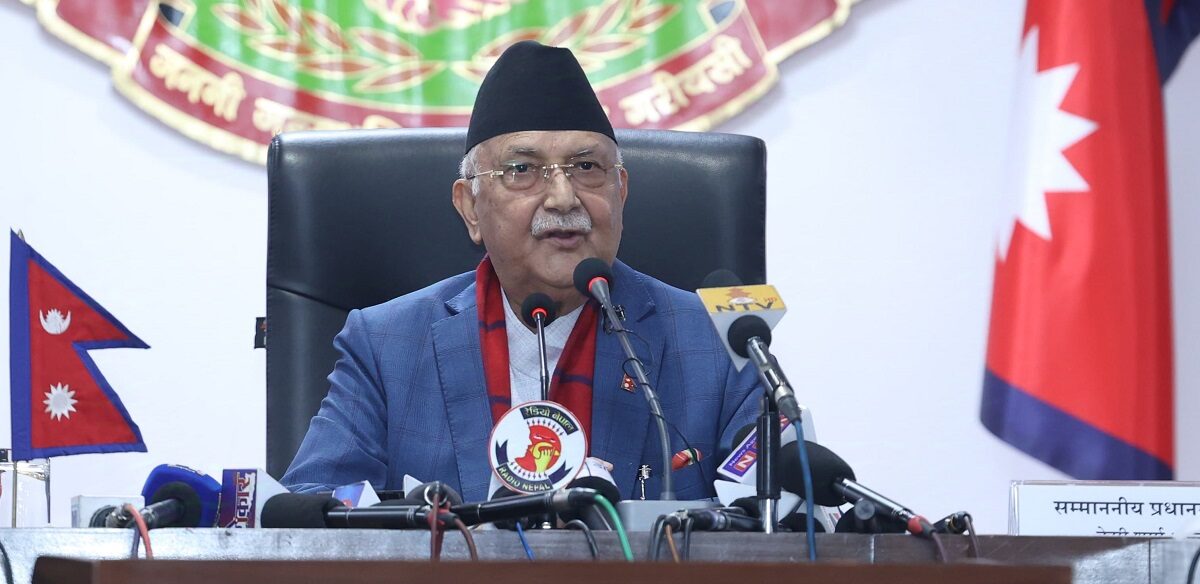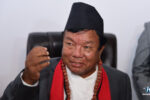KATHMANDU: The coalition government formed by the Nepali Congress and the CPN-UML has struggled to achieve its key priorities during what was expected to be its ‘honeymoon’ period.
The coalition government has not met the commitments outlined in the agreement signed by the party leaders on July 1, which aimed to share power and establish a foundation for governance.
In a seven-point agreement signed by Nepali Congress President Sher Bahadur Deuba and CPN-UML Chairman KP Oli—who is also the Prime Minister—the top priority was to “build a government of national consensus.”
The second priority was the need for constitutional amendments. The agreement stated, “The government of national consensus will review the strengths and weaknesses that have emerged since the constitution came into effect, prioritizing necessary amendments and creating appropriate laws for political stability.”
The third priority was strengthening the country’s economic situation, emphasizing the need to eliminate laxities in the economy, create a reliable business environment, and encourage both internal and external investment to generate adequate and decent jobs.
However, the Oli-led government has failed to deliver on this front. From the beginning, it has not actively reached out to opposition parties to participate in the government and establish a true national consensus.
However, as the ‘honeymoon period’ of 100 days of the Oli-led government comes to a close, it is evident that these key agendas have been neglected.
The government has failed to foster consensus for a national consensus government and has not initiated any constitutional amendment processes or taken concrete steps to alleviate the ongoing economic distress.
Despite completing 100 days under UML Chair Oli’s leadership, economic stagnation persists.
The stock market, which initially showed promise, has recently experienced unusual fluctuations.
Although banks have accumulated substantial liquidity for investment, interest rates are decreasing due to the inability to issue loans.
Traders who took loans to import goods for the Dashain festival are now struggling with capital and interest burdens, as satisfactory business opportunities are lacking.
Industrialists have voiced concerns about dwindling market demand, which has created uncertainty for product and distribution chains.
Even with UML Vice Chair Bishnu Paudel leading the Ministry of Finance, effective budget management and resource allocation have not been achieved during this critical period.
From an economic perspective, it appears that the Oli-led government has made little progress in budget implementation.
Political analyst Shankar Tiwari notes, “Finance Minister Paudel does not seem to have established the necessary trust in the business community.”
According to the office of the Comptroller General, by the end of the first three months of the fiscal year, the government managed to collect only 17.34 percent of its target revenue.
The government set a total revenue target of NPR 1.471 trillion but collected only NPR 255 billion by October 17.
So far, the government has spent NPR 329 billion out of a total budget of NPR 1.860 trillion, representing 17.72 percent of the budget.
Although current expenditures reached 20.18 percent of the target, capital expenditure—which is crucial for economic growth—stands at only 8.36 percent.
Former Prime Minister Pushpa Kamal Dahal ‘Prachanda’, Chairman of the Maoist Center had previously highlighted the importance of the second point in the agreement between Deuba and Oli regarding constitutional amendments for political stability.
However, no initiatives have been taken to amend the constitution as agreed upon by the Congress-UML coalition.
The government has not discussed this critical issue in Parliament, nor has there been any inter-party dialogue on the matter.
Political analyst Indra Adhikari expresses concern that the main agenda for which this government was formed has lost all momentum.
He questions why the government failed to initiate constitutional amendments during its honeymoon period.
“This government lacks a vision for nation-building,” he asserts. “The situation is deteriorating, and the government appears focused on addressing the people’s dissatisfaction out of a sense of vengeance rather than genuine concern.”
Shankar Tiwari further claims that the Congress-UML coalition is not inclined to pursue constitutional amendments, suggesting that the two major parties used the issue as a pretext to replace the previous government and establish a new one.
“I stated from the outset that this government was not formed with the intention of amending the constitution; it was created merely as an excuse,” analyst Tiwari told Khabarhub.
The groundwork for constitutional amendments has not been established.
In the seven-point agreement signed to overthrow the Prachanda-led government and establish a new one, the top priority was to “build a government of national consensus.”
The situation is deteriorating, and the government seems more focused on avenging past grievances than addressing public dissatisfaction.
This point emphasized the need “to protect the national interest in accordance with the wishes of the common people, maintain good governance by combating corruption, accelerate national development, and form a government of national consensus under Article 76 (2) of the Constitution by involving other political parties for political stability.”
However, the Oli-led government has failed to deliver on this front. From the beginning, it has not actively reached out to opposition parties to participate in the government and establish a true national consensus.
Both Congress President Deuba and Prime Minister Oli agreed on the importance of maintaining good governance by addressing corruption.
Yet, the government has not taken concrete steps to control corruption or uphold good governance.
Nonetheless, the recent arrests of individuals recommended for action by the parliamentary committee investigating the cooperative fraud case have sparked some hope.
Tiwari remarked, “The government’s stance on the cooperative issue should be viewed positively. Those who believe in the rule of law and justice are particularly encouraged by this development.”
There was no substantial reason for the change in government; the only justification for the alliance shift was the need for constitutional amendments.
The two major parties indicated that the electoral system has contributed to the chaos currently observed.
There were also calls for greater inclusion of various interests during the constitution’s drafting.
The belief was that a coalition of the two major parties would strengthen the government, as their combined numbers in Parliament would create a more favorable environment for amending the constitution.
However, if constitutional amendments are to be pursued, the government must first establish a clear basis for them.
What are the specific subjects and actions required for the amendments? What is the proposed modality? There has been little visible effort in these areas.
The coalition asserted that by presenting a unified front, they were ready to collaborate with the two major parties.
However, no progress has been made on the understanding that collaboration between the major parties was essential for constitutional amendments and improving the political landscape.
It appears unable to sustain the initial enthusiasm that followed its formation. Especially after the recent disasters caused by floods and landslides, the government has taken a step back.
No discussions have occurred in Parliament, nor has there been any dialogue among the parties.
The government has failed to act, resulting in zero momentum on the primary agenda that formed the basis for its establishment.
Why has there been no progress?
This government lacks a clear vision. It was not formed with the goal of nation-building.
The situation is deteriorating, and the government seems more focused on avenging past grievances than addressing public dissatisfaction.
The leadership has not engaged in a committed and deep exploration of governance changes thus far.
Instead of effecting change, their aim appears to be gaining power, basking in that power, concealing previous failures, and exploiting the state for electoral gains. This trend continues unabated.
In some instances, whether due to fate or revenge, the recent actions suggest that the government may be attempting to address corruption.
Previously, the government had shielded individuals involved in the embezzlement of funds meant for vulnerable citizens.
That has changed, marking a notable achievement. How this initiative develops will depend on the efforts of the political parties involved.
In the health sector, improvements are evident. Until recently, the country had only one burn treatment hospital, but facilities are now expanding to various regions.
The Health Minister has been actively sharing updates on social media, and the Prime Minister has shown support for these developments. This increased awareness is vital.
However, the opposition remains in a similar predicament. The criticisms raised yesterday by the government are now being echoed by the current administration.
Yet, the opposition seems eager to undermine the government rather than engage constructively.
The political landscape is characterized by manipulation rather than a commitment to results-oriented governance.
There is a lack of patience among opposition members and no effort to foster cooperation within the government.
As for Foreign Minister Dr. Arju Rana Deuba, while Delhi and New York are traditional platforms for diplomatic visibility, her performance has not been particularly noteworthy outside of these settings.
Instead, there is a focus on maintaining power through tactical maneuvering rather than genuine collaboration.
Additionally, the government has been slow to address issues of good governance.
It appears unable to sustain the initial enthusiasm that followed its formation. Especially after the recent disasters caused by floods and landslides, the government has taken a step back.
Its attempts to introduce an ordinance regarding political parties have only had a more negative impact.
However, the government’s stance on the cooperative case should be viewed positively.
Those who believe in the rule of law and justice are particularly encouraged by this development.
The Prime Minister’s success is contingent on the government’s overall success. A standout minister is essential for effective governance, and that has not been apparent.
Health Minister Pradeep Poudel and Agriculture Minister Ramnath Adhikari can be seen as exceptions to this trend.
The Health Minister has made a few commendable efforts, while the visibility of the Agriculture Minister is noticeable.
In contrast, Finance Minister Bishnu Paudel has not managed to create the necessary environment for business growth.
As for Foreign Minister Dr. Arju Rana Deuba, while Delhi and New York are traditional platforms for diplomatic visibility, her performance has not been particularly noteworthy outside of these settings.
It seems the issue concerning Israel has concluded, and Bipin Joshi is expected to return.









Comment